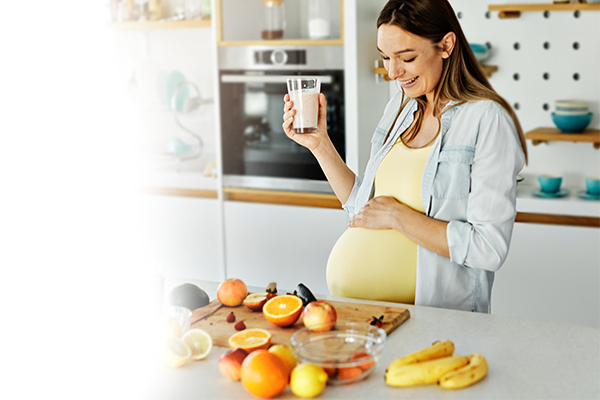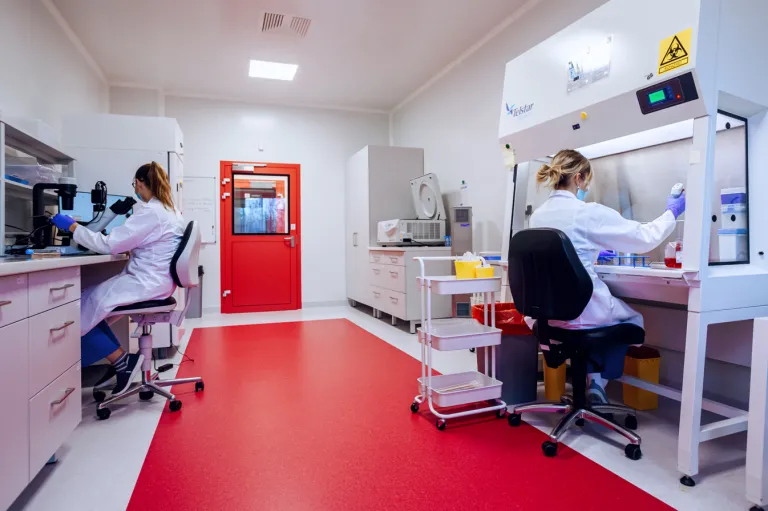A balanced diet during pregnancy is a priority for a pregnant woman to enjoy full health and ensure the proper development of the baby. It's a good idea to plan a healthy diet in advance, eliminating ingredients that can sensitize or aggravate pregnancy discomforts. What to eat during pregnancy, and what foods to avoid? It's a good idea to consult with your health care provider about your daily menu.
Why is proper nutrition during pregnancy important?
Women should follow a proper diet not only during pregnancy, but already at the planning stage. What’s more, the daily menu must also be appropriate after childbirth, during the postpartum period and while breastfeeding.
Pregnancy diet should always be individual, it is to take into account the preferences of the mother-to-be and her health condition. It should be adapted to her lifestyle, and the necessary nutrients are important, looking also at the health of the child.
Did you know that the recommendations of the Polish Gynecological Society indicate the right diet during pregnancy, taking into account the entire course of pregnancy? Providing essential nutrients can minimize the risk of miscarriage, the risk of premature birth or the risk of fetal defects. These include neural tube defects, craniofacial defects, nervous system disorders or abnormal development of the child’s internal organs. Find out what vitamins and minerals are particularly important when planning a diet during pregnancy, and what to avoid in a pregnant woman’s menu.
The main principles of nutrition for pregnant women
Consuming specific nutrients is important throughout pregnancy, regardless of trimester. The most important dietary rules for moms-to-be include:
- Eating regular meals,
- Eating five servings each day,
- Drinking at least 2 liters of water,
- eating in the right proportions, it is better to eat smaller portions during pregnancy, but more often.
It is worth remembering that diet can combat typical pregnancy discomforts, such as heartburn, constipation, nausea, which significantly impede daily functioning during pregnancy. The diet of pregnant women should be rich in:
- fiber,
- folic acid,
- fatty acids,
- The right amount of protein.
Pregnancy diet should include only fresh, preferably seasonal and natural plant and animal products. Ideally, they are free of preservatives, artificial colors, sulfates and emulsifiers. You should also exclude any allergens during pregnancy.
Energy requirements of pregnant women
The energy requirements of pregnant women change with the stages of pregnancy. It is not only important what nutrients the mother-to-be consumes, but also how much she puts on her plate. The caloric content of the dishes is important because weight control during pregnancy and any weight gain can be important for her health and the proper development of the fetus.
During the first trimester of pregnancy, the diet should not change much, looking at the caloric content of meals. Only in the second trimester of pregnancy should the mother-to-be consume about +360 calories more each day, and in the third trimester an average of +475 calories per day.
Regardless of calories, the basis is a healthy pregnancy diet rich in minerals, vitamins, with a high content of folic acid.
Pregnancy vitamins – what does a mom-to-be need?
The diet of women planning pregnancy and in the early stages of pregnancy should primarily include folic acid. It is he who supports the development of the neural tube. Among the most important vitamins that are particularly important during pregnancy are:
- Vitamin D – has an important function in terms of bone formation,
- Vitamin E – has antioxidant activity,
- Vitamin B – affects the development of the child’s nervous system.
Interestingly, some vitamins in too large an amount can have harmful effects on fetal development. These include, among others, vitamin A.
Diet during pregnancy – what to eat to ensure the proper development of the fetus?
Pregnant women should carefully compose their meals. The diet during pregnancy must be balanced, wholesome, varied, but also tasty. Healthy eating should involve not only a temporary diet during pregnancy, but also after it. It is important for the mother-to-be to acquire new and better eating habits.
What nutrients should be in your daily diet? These include:
- Sources of folic acid, for example, pulses, spinach, chickpeas, Brussels sprouts, broccoli, sunflower, chicken eggs,
- Dairy products, but excluding unpasteurized milk to increase calcium absorption,
- Vegetable fats, vegetable oils such as canola oil, grapeseed oil and olive oil,
- Cereal products, including coarse grain bread, whole wheat bran, oatmeal,
- Lean marine fish and seafood,
- Lean meat, such as poultry meat,
- Fresh fruits, including fresh juices,
- Foods rich in fiber, such as dried figs, apricots and buckwheat groats,
- Mineral water of about 2 liters each day.
A diet during pregnancy should not assume eating for two. The normal weight gain, is about 10-13 kilograms of a pregnant woman, and the normal weight of the baby after birth is about 4 kilograms. Pregnancy weight control is also advisable if a pregnant woman gains weight too quickly.
While expecting a baby, a woman must not use starvation or experimental weight-loss diets, and any changes in daily nutrition should be consulted with a nutritionist. Deficiency of certain nutrients or consumption of unhealthy foods can harm the baby, slowing or even stopping fetal development.
What can’t you eat during pregnancy?
The diet during pregnancy must, above all, be healthy, rich in valuable vitamins and minerals. Pregnant women must be aware that they are responsible not only for their own health, but also for the development of the fetus. Proper nutrition for moms-to-be should involve rejecting all harmful products, such as:
- highly processed products,
- fast food products,
- Products with high sugar content,
- Products with a high content of simple carbohydrates,
- Bloating and heartburn-inducing products such as cabbage, peas or mushrooms,
- Products with preservatives, colors and artificial substances.
Pregnant women are not advised to eat raw fish, and oily sea fish and unpasteurized milk are also not recommended. All products that can be eaten raw should be thoroughly washed.
The best dishes for pregnant ladies are those cooked, possibly stewed. Eating fried foods, especially those prepared in deep oil, is discouraged.
Diet in gestational diabetes – what to pay special attention to?
Most women diagnosed with gestational diabetes do not need to take insulin. The basis within the framework of ensuring the proper development of the child in this case is a proper diet. In fact, the diet in gestational diabetes differs little from that of fully healthy mothers-to-be.
What products from the daily menu does the diabetic diet exclude? These are primarily:
- animal fats,
- fatty dairy products,
- simple carbohydrates.
In order to maintain a healthy diet with gestational diabetes, the mother-to-be should shun foods with high sugar content, fried dishes, fatty, caloric and hard to digest foods. It is better to shun sweets, sweetened drinks or processed fruits.
The diabetic diet involves eating regularly, in 3-4 meals. hourly intervals.
A varied diet for the postpartum woman
The diet in the postpartum period and throughout lactation should not differ from that of pregnancy, at least in terms of the use of vitamins and intake of valuable nutrients. It is good if the new eating habits still include rich sources of folic acid, fiber, vitamin D or vitamin C.
Both the diet during pregnancy, as well as that in the postpartum period and the entire period of natural lactation exclude the intake of allergens. A nursing woman should pay attention not only to the ingredients that can sensitize not only her, but also the baby. Such products most often include nuts, chocolate, soy, chicken eggs.
FAS syndrome – what is the risk of drinking alcohol during pregnancy?
Alcohol during pregnancy and lactation is absolutely prohibited. Alcohol consumption during pregnancy is associated with the risk of fetal alcohol syndrome (otherwise known as FAS syndrome) – damaging mainly the nervous system and affecting low birth weight of the newborn. Infants with FAS syndrome may develop depression and anxiety, for example, later in life.
FAQ
- Why is folic acid in a pregnant woman’s diet so important?
Folic acid has a beneficial effect, taking into account the blood vessels of pregnant women and the number of red blood cells. Its deficiency can cause anemia. Folic acid is also important for child development. For example, it minimizes the risk of spinal defects and the risk of having a baby with a neural tube defect.
- What is the best diet during pregnancy?
The diet during pregnancy should be balanced, varied and tasty. The mother-to-be should consider natural, unprocessed, organic and fresh products above all. The daily menu should include products rich in fiber, folic acid, vitamin D, C, E and B vitamins. It is important to have a healthy diet not only during pregnancy, but also in the postpartum period and during breastfeeding.
- What should pregnant women not eat?
During pregnancy, heavy, fatty and fried foods should not be eaten. It is best to exclude those highly processed, fast food, full of preservatives and artificial ingredients. Pregnant women should not eat bloating and heartburn-inducing foods. It is better to exclude sweets, strong coffee and carbonated drinks. Alcohol is prohibited during pregnancy and lactation.
Rate this article:










